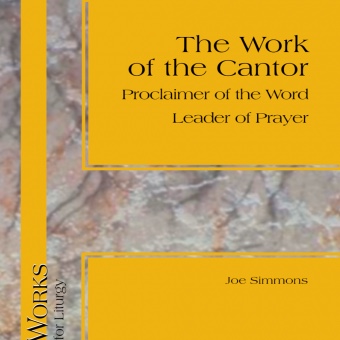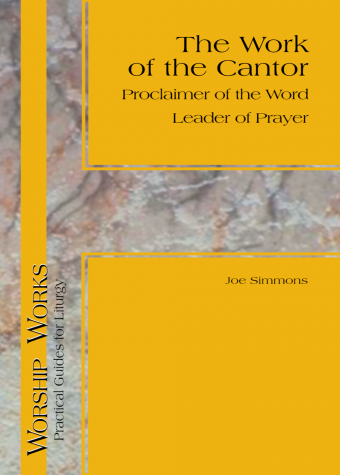The season of Lent calls us to transformation through prayer, fasting, and almsgiving as we prepare ourselves to celebrate the passion, death, and resurrection of Christ. As leaders of prayer, cantors play an important role in helping faith communities enter more deeply into this reflection through attentive preparation and effective communication of the responsorial psalm.
This commission invites us to embrace the next level in our ministry beyond learning the notes and singing a pleasant melody. It means reading the entire psalm in the Bible, praying with it, consulting a Bible commentary, reading and reflecting on the scripture readings of the day, analyzing the psalm’s poetry, expressing the text artistically, and not shying away from the range of feelings expressed in the prayers when we proclaim them.
In this overview of seasonal Psalms, I will speak in the identity of the psalmist when referring to specific passages. By claiming the voice of the psalmist, I avoid detaching myself from the raw and authentic prayer. I have also included reflection questions throughout in italics.
Psalm 51
In this penitential lament, I lead my community as we ask God to free us from sin and the guilt and alienation it causes (Richard Clifford, Collegeville Bible Commentary, Vol. 22: Psalms 1-72, pg. 56). In all four verses, I speak directly to God about my own sinfulness and desire for a clean heart. In the response, however, we make our plea for God’s mercy as a community.
Many settings of Psalm 51 use dissonant harmonies to mirror the poetry’s sense of deep desire for God. Use this to help communicate the text more authentically. The interpretive challenge in this psalm is to strike a balance between acknowledging and expressing my own sinfulness and allowing the rest of the assembly to do the same. While it’s prudent to avoid melodrama, it’s also important to go further than usual to communicate an authentic plea. How do I push God away in my life? How strongly do I desire to be open to God?
In verse 1, I state the main request for God to have mercy on me and wash me clean from sin. Emphasize such words as mercy, greatness, compassion, wash me, guilt, and cleanse. In verse 2, “I acknowledge my offense.” Do I really acknowledge my own sinfulness or am I merely singing words attached to notes?The stronger plea in verse 3 calls for additional weight and urgency in the voice. What is happening in my life when I experience God absent?Verse 4 becomes even stronger as I plead for a return to the joy of God’s salvation and I promise to proclaim God’s praise if God opens my lips. How have I experienced joy in God’s salvation? How does that joy compel me to praise God? What does it look like on my face and body and sound like in my voice?
Psalm 91
This psalm of trust reassures those who live justly that God will protect and defend them in all adversities (Clifford, 29). In verse 1, I speak to those who live justly, who trust in God as their refuge. As this articulates the main idea of the psalm, give these words some vocal weight.
In verses 2 and 3, I assure the community that no harm will come to us because God’s angels are commanded to guard us. How can my voice and delivery reassure?Verse 3 can build in vocal intensity, since its language is stronger than that of verse 2. Stress the dramatic action verbs, treadand trample.Remember, this is heightened language that call for greater expression!
In verse 4, I speak in the words of God, who reassures us that we will be answered when we call, that God will be with us in distress and liberate and save us. I recommend a slightly slower tempo and change in vocal color to make clear of the change in speaker. How do I imagine God speaking to us?Vocal clichés that have God speaking in a stilted delivery are less effective than a more human expression. Also, I suggest drawing out the final phrase a bit: “I will deliver him and glorify him.”
Psalm 130
In another penitential lament, Psalm 130 reminds us of the Lenten theme of hope in God’s enduring and redeeming mercy (Irene Nowell, The Psalms in the Sunday Lectionary, page 67). Although the response is comforting, the verses range from resolute pleading to trusting declaration.
As you reflect on this psalm, consider how much of its language reveals the conversational intimacy between God and Israel. In verse 1, for example, I speak to God and implore God to hear me. Don’t be afraid to sound insistent!
In the second verse, I say to God that if all our sins were counted, none of us would be left standing! Verse 3 contrasts the previous two as I declare trust in God’s word and pledge vigilance for God. This calls for a gentler and more comforting delivery.
Verse 4 continues the sentiment of the previous one but transfers it into the context of the community. I recommend more volume and vocal intensity to express the joy in this message. Emphasize kindness, plenteous redemption, redeem Israel, and iniquities.
Psalm 22
This powerful lament is the designated psalm for Palm Sunday in years A, B, and C and may continue as the common psalm for Holy Week. The psalm was quoted by Jesus on the cross (Matthew and Mark), and sections are mentioned in his passion. This psalm invites us to reflect on our own identification with Christ’s passion.
Psalm 22 follows the characteristic structure of most laments. In the response, we cry out to God in disbelief. Therefore, my delivery must draw people into this striking prayer. Verses 1 and 2 state the complaint in dramatic and vivid language. Have I ever felt mocked because of my faith? Or how can I identify with others who have experienced persecution because of their faith?Verse 2 tells of being surrounded by dogs and evildoers and being pierced in the hands and feet. How can I identify with such terror and pain? Even if I have never felt this, how can I better understand others around the world who have?
In verse 3, I suddenly move from despair (“They divide my garments among them”) to hope in the Lord and a plea for God’s help (“O my help, hasten to aid me”). This pattern is common in laments. How can my voice convey trust in God?
Also, in keeping with the lament form, I move from the trust in verse 3 to a promise to praise God in the assembly in verse 4. This is where the psalm reaches a hopeful climax and my delivery must communicate deep conviction. I suggest an increase in volume and emphasis of important words: “praise him” and “revere him, all you descendants of Jacob.”
The larger mission
The common psalms of Lent and Holy Week offer much food for our spirits. While many of us manage to make personal sacrifices during Lent, it often remains difficult for some to embrace the larger mission of reflecting on our own dying and rising with Christ and how that calls us to serve one another. Let us pray that during this Lenten season, we cantors will accept the challenge to dig deeper into our hearts so that we and those we serve find transformation and healing through the Paschal Mystery.
This article is an adaptation of a chapter from the following resource. For more information, click on the title or cover image.
The Work of the Cantor: Proclaimer of the Word, Leader of Prayer
Joe Simmons
017287
Master cantor teacher Joe Simmons uses the common responsorial psalms of the liturgical year to provide cantors with a variety of skills for their musical leadership. Through prayerful reflection upon and examination of the psalms’ poetry, he brings cantors to a deeper understanding of their role in proclaiming the word, and increases proficiency in leading the assembly in prayer. Generously illustrated with practical and easy-to-follow musical examples, this book will assist music directors in the formation and training of cantors, and is an excellent resource to put in every individual cantor’s hands!



Recent Comments